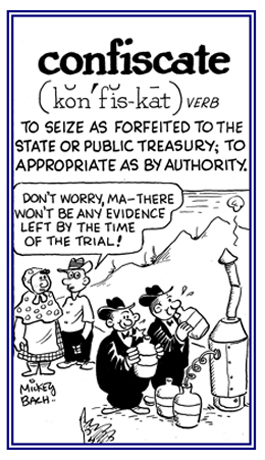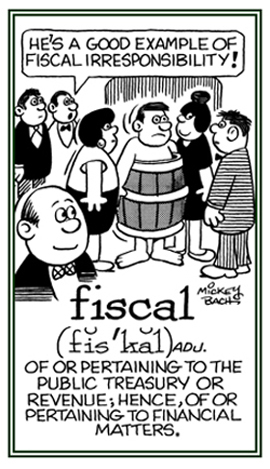fisc-, fiscal
(Latin: from fuscus, a small rush basket; then, a purse, public purse, public revenue)
confiscate (KAHN fi skayt") (verb), confiscates; confiscated; confiscating
1. To seize property legally forfeited to the public treasury as a penalty for some illegal activity: The custom's officials were confiscating illegal goods that were being brought into their country by truck.
2. Having had property taken away legally or by forfeiture: While being in the foreign country, Monika’s camera was confiscated by the police because she was taking pictures of the paintings in the museum, which was against the law.
3. A governmental act of seizing someone's assets without payment or to take a person's private property for public use without reasonable compensation: The government agents confiscated a woman's new car because she had used it to illegally transport contraband cigarettes and cigars.
4. Etymology: from the 1550s, originally, "to appropriate for the treasury"; from Latin confiscatus, the past participle of confiscare, from com-, "together" + fiscus, "public treasury"; literally, "money basket".

© ALL rights are reserved.
Go to this Word A Day Revisited Index
2. Having had property taken away legally or by forfeiture: While being in the foreign country, Monika’s camera was confiscated by the police because she was taking pictures of the paintings in the museum, which was against the law.
3. A governmental act of seizing someone's assets without payment or to take a person's private property for public use without reasonable compensation: The government agents confiscated a woman's new car because she had used it to illegally transport contraband cigarettes and cigars.
4. Etymology: from the 1550s, originally, "to appropriate for the treasury"; from Latin confiscatus, the past participle of confiscare, from com-, "together" + fiscus, "public treasury"; literally, "money basket".

Go to this Word A Day Revisited Index
so you can see more of Mickey Bach's cartoons.
1. The appropriation or seizure of private property for public use without compensation.
2. The act by which the estate, goods ,or chattels of a person who has been guilty of some crime, or who is a public enemy, is declared to be forfeited for the benefit of the public treasury.
3. The act of seizing property without compensation and submitting it to the public treasury: Illegal items; such as, narcotics, firearms, or profits from the sale of illegal items, are often confiscated by the police.
2. The act by which the estate, goods ,or chattels of a person who has been guilty of some crime, or who is a public enemy, is declared to be forfeited for the benefit of the public treasury.
3. The act of seizing property without compensation and submitting it to the public treasury: Illegal items; such as, narcotics, firearms, or profits from the sale of illegal items, are often confiscated by the police.
fiscal (adjective), more fiscal, most fiscal
1. Relating to public revenues; especially, the income from government fees: Some say that higher taxes on the salaries of the very rich would add more to the fiscal or financial strength of the country.
2. Referring to national, state, or community expenditures and debt: The prudent fiscal policies of Tom's city have saved it from further unnecessary spending.
3. Of or relating to financial matters in general: The governor of Erla's state will meet with his advisors to discuss fiscal issues.

© ALL rights are reserved.
Go to this Word A Day Revisited Index
2. Referring to national, state, or community expenditures and debt: The prudent fiscal policies of Tom's city have saved it from further unnecessary spending.
3. Of or relating to financial matters in general: The governor of Erla's state will meet with his advisors to discuss fiscal issues.

Go to this Word A Day Revisited Index
so you can see more of Mickey Bach's cartoons.
A reduction in a government budget deficit, which can result from a reduction in government expenditures, an increase in tax revenues, or both at the same time.
The total revenues, and total expenditures, of a government.
A political term used to describe a policy that advocates avoiding deficit spending: Fiscal conservatism usually considers the reduction of overall government spending and national debt; as well as, ensuring a balanced budget to be of major importance.
Free trade, deregulation of the economy, lower taxes, and other conservative policies are also often related to fiscal conservatism.
When a unit of government has an excess of government spending over income and is unable to borrow to finance it: For a national government, a fiscal crisis is most likely a result of a large accumulated debt together with doubts about its ability or willingness to pay back that debt.
fiscal deficit
A deficit in the government budget of a country; and so, a budget deficit or an excess of government spending beyond the receipts the government gets from taxes.
fiscal discipline
Management of the government budget in order to avoid excessive fiscal deficits.
This is geared to restrain government spending and/or initiate a procedure to increase taxes.
fiscal drag
The dampening effect on aggregate demand that occurs when an expanding economy creates additional tax revenues; especially, with a progressive income tax so it becomes an example of an automatic stabilizer.
fiscal policy
Any policy involving the levels of government purchases, transfers, or taxes; which is usually specifically focused on domestic goods, residents, or firms.
fiscal stimulus
A tax cut and/or an increase in government spending.
This program tends to increase aggregate demand and therefore the level of economic activity in the short run.
Dire financial or economic distress created by fiscal mismanagement: So many people keep hearing about the many fiscalamities that are taking place in all parts of the world.
fiscalism (noun)
A term used to refer to the economic theory that a government should rely on fiscal policy as the main instrument of macroeconomic policy.
<img src="/img/left_arrow_sm.gif" alt="" /> <img src="/img/right_arrow_sm.gif" alt="" />
Showing 1 page of 14 main-word entries or main-word-entry groups.
